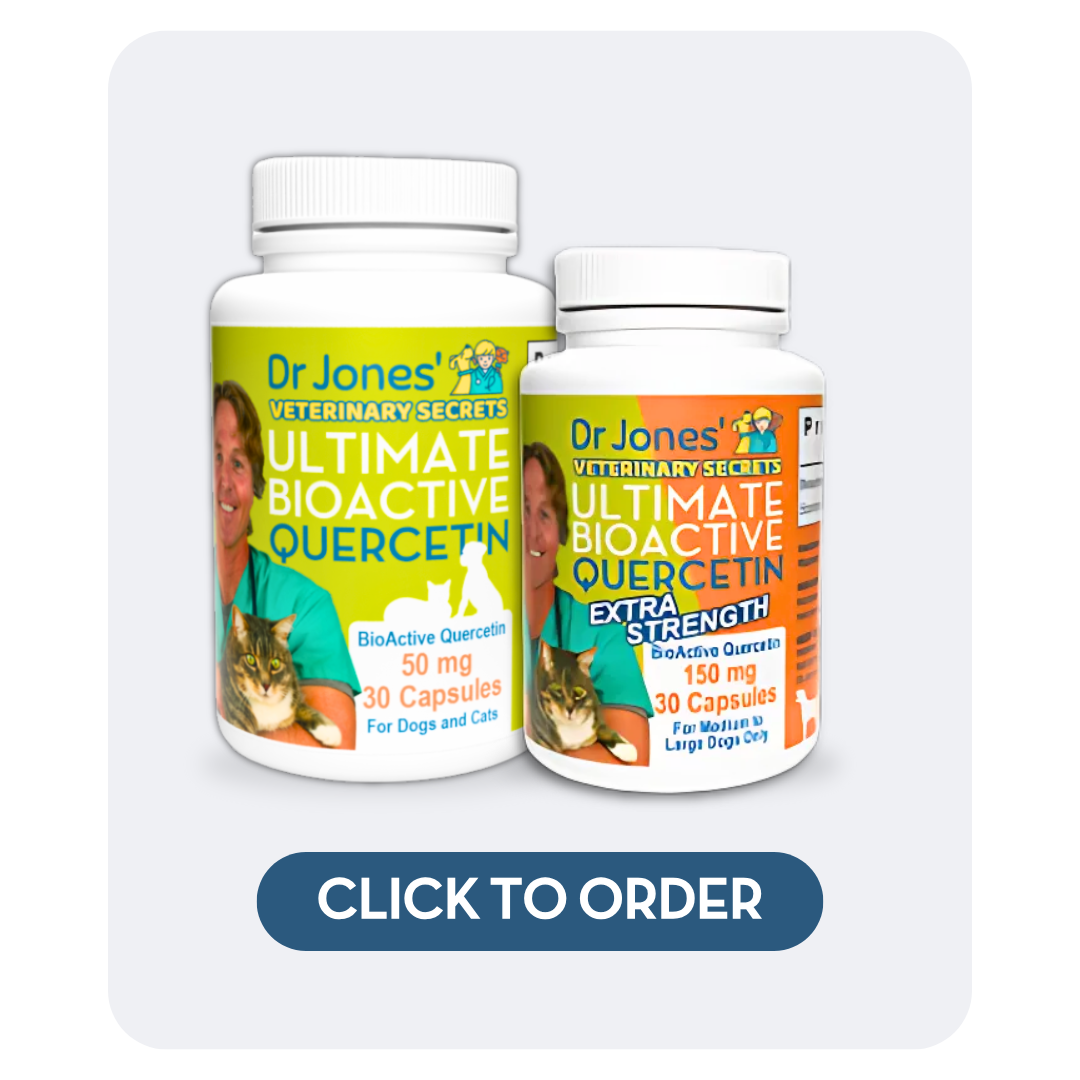How to Stop Pet Allergies Naturally: Effective Remedies to Stop Pet Allergies
![]()

What Are the Most Common Causes of Allergies in Pets?
There are numerous potential causes of allergies in pets. In fact, allergies are one of the most common reasons I see dogs in my practice. Approximately 20-25% of dogs suffer from some form of skin disease related to allergies. This includes itching, scratching, and recurrent ear infections. Even in cats, allergies seem to be on the rise, with 15% of all cats experiencing skin issues at some point in their lives.
An allergy occurs when the immune system overreacts to something that it deems harmful, even though it’s not. In most pets, the underlying cause is environmental. For instance, when pollen or another protein enters your pet’s skin, their immune system treats it as an invader, triggering the itchy-scratchy cycle.
Some of the underlying causes include:
-
Genetics: Certain breeds are more prone to allergies.
-
Vaccines: Some pets may react to vaccinations.
-
Environmental toxins: Things like pesticides and household cleaners can affect the immune system.
-
Gut health: The microbiome plays a role in immune responses.
-
Medications: Some treatments can alter the immune system.
Common allergens include pollen, house dust mites, fleas, food proteins, and even environmental toxins like pesticides. Cats are less prone to allergies than dogs, but food allergies, especially to fish, dairy, and proteins like beef or pork, are still common.
One of the most effective natural remedies for reducing these symptoms is Essential Fatty Acids (EFA), particularly Omega-3 fatty acids. These powerful anti-inflammatory fats, including EPA and DHA, play a crucial role in calming inflammation and helping to interrupt the persistent itch-scratch cycle that many pets with allergies experience.
Promote Better Health with Dr. Jones’ Ultimate Omega 3 Formula for Dogs and Cats
For a high-quality solution, I recommend Dr. Jones’ Ultimate Omega 3 Formula for Dogs and Cats, which is specially designed to support your pet’s skin health, reduce allergy-related inflammation, and promote overall well-being. Give your pet the relief they deserve with this premium, potent formula!


Signs and Symptoms of Allergies in Pets
For many pets, allergies are seasonal, worsening in the spring, summer, and fall. The most common and noticeable sign is itching. Pets often itch their face, paws, or other body parts. Other signs include:
-
Excessive paw licking
-
Recurring ear infections
-
Hair loss
-
Secondary skin infections, often caused by constant scratching
-
Reddish bumps or postules on the skin
In dogs, some may also exhibit unusual symptoms like dragging their bum, which can sometimes be a sign of allergies affecting the anal glands. For cats, food allergies often lead to itching, especially around the face and chin.
In more severe cases, you may notice changes in the skin, like thickening or darkening of the skin due to chronic irritation. It’s important to treat these allergies early to avoid long-term damage to the skin.
Top Natural Remedies for Pet Allergies
I often recommend a combination of conventional treatments and natural remedies. Here are a few top natural options to try:
-
Antihistamines
For immediate relief, antihistamines like Benadryl are commonly used. The typical dose is 1 mg per pound, two to three times a day. However, a newer antihistamine called Zyrtec (cetirizine) is often preferred for its longer-lasting effects and fewer sedating side effects. I recommend 5 mg per 10 pounds of body weight once a day. -
Essential Fatty Acids (EFA)
Omega-3 fatty acids are crucial for reducing inflammation. High doses of EPA and DHA (anti-inflammatory fatty acids) can help interrupt the itch-scratch cycle. I recommend 500 mg per 10-20 pounds of body weight daily, with a high enough dose to see results after about three months. -
Herbal Remedies
-
Nettle Tea: Nettle acts as a natural antihistamine. You can make nettle tea and offer it in place of your pet’s water for two weeks to help with itching.
-
Licorice Root: Known for its anti-inflammatory properties, licorice root tincture can be effective for short-term use (up to 14 days). It can help with severe itching.
-
Lavender Oil: Lavender has antifungal, antibacterial, and antihistamine properties, which make it a great addition to your pet’s routine. 10 drops in a diffuser can be soothing.
-
-
Sunflower Oil for Skin Rebuilding
Applying topical sunflower oil to your pet’s skin can help rebuild the skin barrier and prevent allergens from penetrating. Apply it to spots on their back or neck, and after a few weeks, you may start seeing a significant improvement. -
Honey for Desensitization
For pets with environmental allergies, local unpasteurized honey can help by gradually desensitizing them to the allergens in your area. It’s best to administer small amounts over two to three months.

Flea and Tick Solutions
While conventional flea and tick treatments are effective, they come with potential side effects, including immunosuppression and long-term health concerns. Thankfully, there are natural alternatives you can try.
-
Neem Oil
Neem oil is a potent natural insecticide, safe for pets when used in the correct concentrations. Add 2 dropper-fulls of neem oil to a cup of water for a 1% dilution and use it as a flea shampoo. -
Essential Oils
Combine cedarwood oil and neem oil to make a flea and tick spray. Apply to your dog or cat twice a week. -
Homemade Flea Shampoo
Mix black tea, neem oil, cedarwood oil, and Castile soap for an effective flea shampoo. Let it sit for 10 minutes before rinsing.
Yeast Infections in Pets
A secondary skin infection caused by yeast is common in pets with chronic allergies. Signs of yeast overgrowth include:
-
Thickened skin
-
Crusty or yellowish patches
-
Unusual odor from the skin, especially in areas like the armpits or paws
To treat yeast infections, you can use coconut oil as a topical application. Additionally, apple cider vinegar is an excellent antifungal and can be added to shampoos for a natural solution.

Conclusion: Addressing Pet Allergies Holistically
Pet allergies are complex, but there are plenty of ways to support your pet naturally. Combining natural remedies like essential fatty acids, antihistamines, herbal supplements, and topical oils can help manage your pet’s symptoms without relying on harsh medications. Always monitor your pet’s response to any treatment and consult your vet for ongoing issues.
Common allergens include pollen, house dust mites, fleas, food proteins, and even environmental toxins like pesticides. Cats are less prone to allergies than dogs, but food allergies, especially to fish, dairy, and proteins like beef or pork, are still common.
Promote Better Health with Dr. Jones’ Ultimate Omega 3 Formula for Dogs and Cats
For a high-quality solution, I recommend Dr. Jones’ Ultimate Omega 3 Formula for Dogs and Cats, which is specially designed to support your pet’s skin health, reduce allergy-related inflammation, and promote overall well-being. Give your pet the relief they deserve with this premium, potent formula!









My boxer mix is on apoquel and Inwant to get him off
Natural Alternatives to Apoquel
Omega-3 Fatty Acids (Fish Oil)
Rich in anti-inflammatory properties, omega-3 fatty acids can help reduce itching and promote skin health. They may take several weeks to show effects, so consistent use is key.
Quercetin
Known as “nature’s Benadryl,” quercetin is a flavonoid with antihistamine and anti-inflammatory effects. It can help manage mild to moderate allergic reactions and is often combined with bromelain to enhance absorption.
Probiotics
Supporting gut health with probiotics can aid in regulating the immune system, potentially reducing allergic reactions. A healthy gut microbiome plays a crucial role in overall immune function.
Herbal Supplements
Herbs like nettle, licorice root, or chamomile possess anti-inflammatory or antihistamine properties that might assist in managing allergic symptoms. These should be used under veterinary guidance.
Coconut Oil
Topically applying coconut oil can soothe and moisturize irritated skin caused by allergies. Its antimicrobial properties may also help prevent secondary infections.
Bovine Colostrum
Rich in antibodies and immune-boosting substances, bovine colostrum can support your dog’s immune system and may alleviate allergy symptoms. Consult your veterinarian before introducing this supplement.
Additional Tips
Dietary Adjustments: Consider a limited-ingredient or hypoallergenic diet to identify and eliminate potential food allergens.
Environmental Control: Regularly bathe your dog with a gentle, hypoallergenic shampoo to remove allergens from the skin. Using an air purifier can also help reduce airborne allergens.
Regular Monitoring: Keep track of your dog’s symptoms and consult your veterinarian regularly to assess the effectiveness of the chosen alternatives.
Check our helpful articles:
https://veterinarysecrets.com/?s=Apoquel
Should I worry about a lump on my dogs rump
Here’s an article that can help:
https://veterinarysecrets.com/dog-lump-and-bump-home-remedies/
My dog has a large growth in his ear after having and awful odor in his ear. He was scratching his ear constantly.
A large growth + odor + constant scratching in the ear is worrying and may go beyond simple allergy. Natural remedies like regular deep cleaning (with white vinegar diluted or green tea + vinegar), using gentle, soothing topicals (olive oil + vitamin E), treating for infection with anti-yeast/anti-bacterial agents, and supporting from inside with Omega-3s and antihistamines or herbal supplements are helpful. But a growth that large may require veterinary biopsy or imaging to see what it really is — natural care may help symptoms but probably won’t replace needed diagnostics.
For allergy and itchy, dry skin better to use dr Jones omega oil or his supplement ultimate canine that contains omega and probiotic?
Hi Magda, we recommend starting with Ultimate Canine, then if you do not see improvement, add in extra Omega 3. You can find both here: https://shop.veterinarysecrets.com/supplements.html